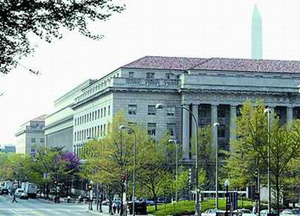
Rushi (WTO entry) was a buzzword for years in China, gaining popular resonance as the country persistently pursued that goal for 15 years.
Now, three years after China's entry into the WTO, the word is often heard again, but this time it means recognition of China's market economy status (MES).
China's WTO membership helped to integrate its economy with the world. But its exports have sometimes been blocked from the main economies, including the US, the EU and Japan, in the name of anti-dumping and other non-tariff barriers. Attaining market economy status is vital to the fair treatment of Chinese products.
On June 3, a special public hearing on China's MES was held in the US. Chinese representatives appeared before the US Department of Commerce to outline the development of China's market economy.
The session -- the first of its kind between China and the United States -- was proposed and finalized at the 15th session of Sino-US Joint Commission on Commerce and Trade, when Chinese Vice Premier Wu Yi met her US counterparts in Washington, D.C.
The US presented six criteria it requires countries to meet before it will accept them as market economies. China believes they are all excessively strict.
"I am not optimistic about it, even before the public hearing. The United States will not easily lift its restrictions on China," said Zhang Xiaoji, a director of the State Council's Development Research Center.
China has made significant progress in its market economy transformation after more than 10 years of reform. According to a report sponsored by Chinese Ministry of Commerce, 69 percent of China's economy is market-based, well above the internationally recognized minimum level of 60 percent required for market economy status.
However, the United States does not accept China's assessment, and its six criteria are all based on its own economic interests, Zhang said.
"The US might recognize China's MES given certain preconditions. It all depends on the development of bilateral trade," he added.
Chen Baosen, a researcher with the Chinese Academy of Social Science, said that the adamant stance of the US is mainly due to political factors. As the US presidential election draws near, Congress and the presidential candidates are willing to sacrifice Sino-US economic ties for votes.
Although China's quest for MES was totally vetoed, the public hearing was still a step forward. "We are not afraid of the voices of opposition. The most important thing is that they are now hearing our explanations," said an official from the Ministry of Commerce.
The United States plays a key role in China's market economy recognition worldwide, but it might be the last to award it, said Chen. However, the public hearing was definitely a good beginning: considered in light of the 15-year-long WTO negotiations, there is probably a long way to go on the MES talks.
Chen suggested that China should focus on breaking through in developing countries and solve the problems one by one.
On April 14, New Zealand became the first to accept China's market economy status. Singapore, Malaysia and Kyrghyz soon followed, and Thailand and Australia are expected to be next. Australia's decision will influence many other countries.
Minister of Commerce Bo Xilai recently told Australian Trade Minister Mark Vaile that only after Australia gives full recognition to China's market economy status will there be a breakthrough in a bilateral FTA. Vaile said that Australia will abide by the framework agreement to resolve the issue of China's MES.
The EU has applauded China's market economy reform. In February this year, it set up a special team to study China's report, which it regards as a foundation for review of the country's MES.
At the EU's request, a supplementary report explaining market economy progress in 2002 and 2003 was quickly completed and forwarded for consideration. Romano Prodi, the president of the European Commission, said in April that an assessment would be released in late June.
(China.org.cn by Tang Fuchun June 21, 2004)
|

